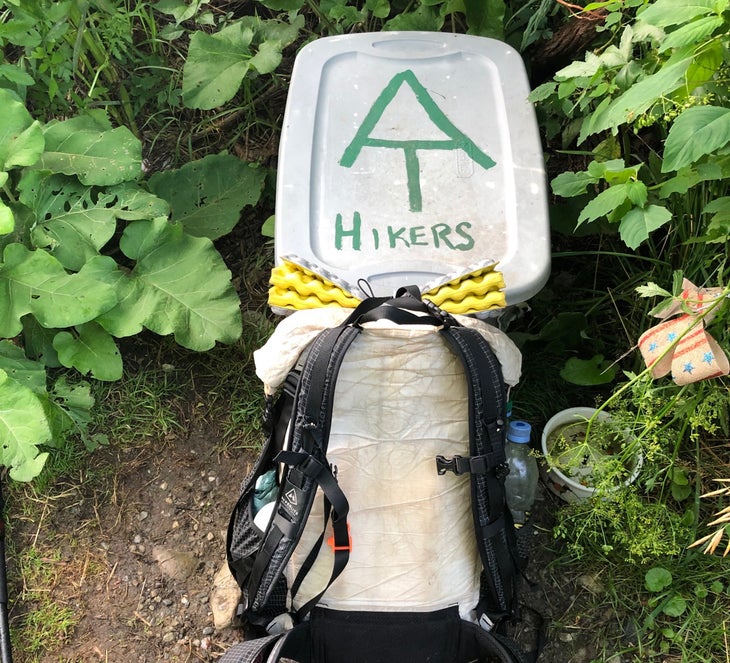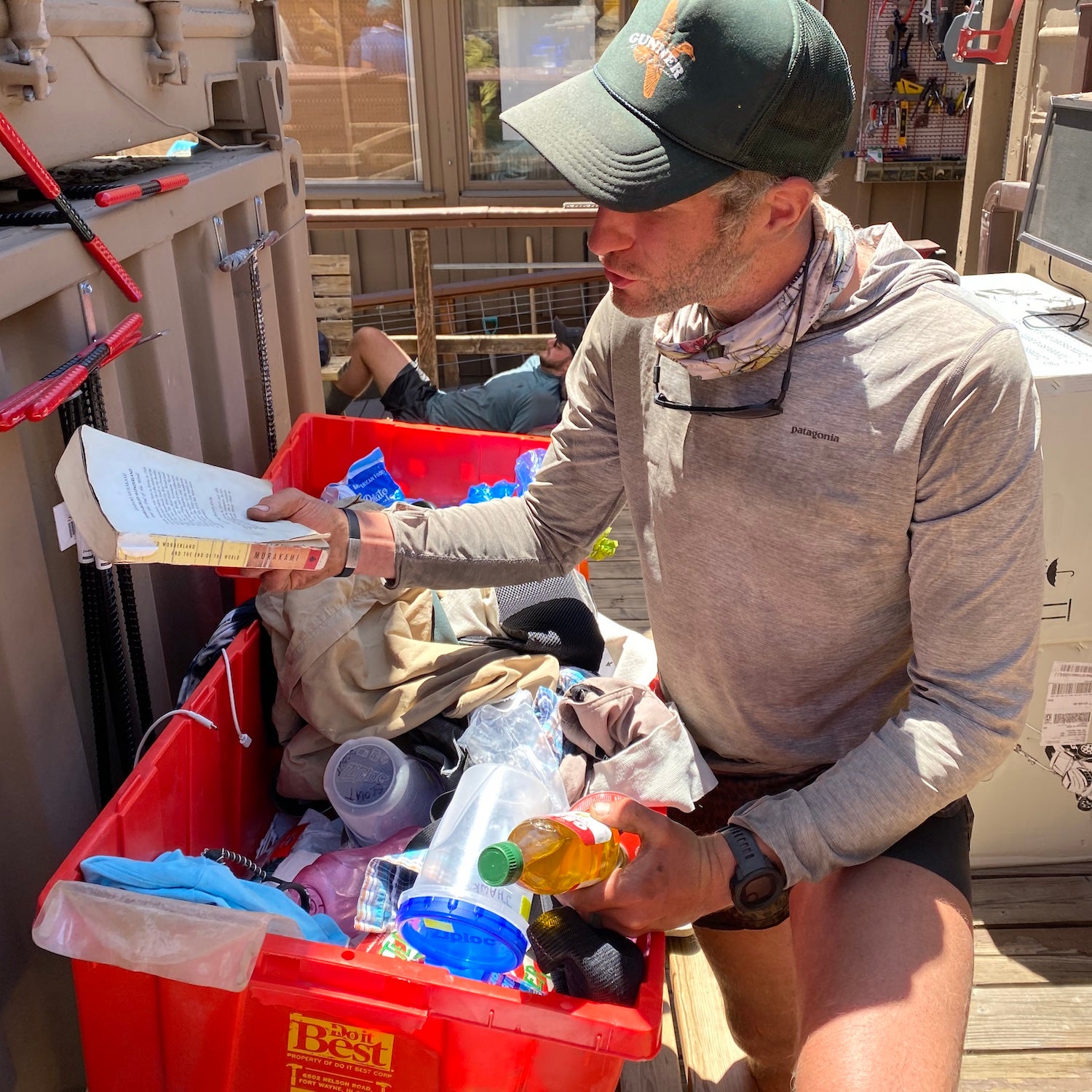My hiking equipment began failing exactly 12 hours before I began walking the Pacific Crest Trail in late April.
Weeks earlier, a company that shall remain unnamed offered up a sample of its flashy new headlamp, a USB-powered beast with an impressive battery life and a few dozen fancy modes ostensibly meant to brighten the night like some laser-light show. But when I plucked the piece from my bag to show it off to my friends at our informal camp a mile north of the trail’s southern terminus, its buttons were stuck, rubber intractably wedged beneath the thin plastic frame. I found my tent that night via cell phone flashlight. I was dejected by the pitch-black portent: How could I make the 2,653-mile journey to Canada if my gear couldn’t even make it to the starting line?
A day and 20 miles later, however, another hiker came to my rescue. Standing beneath a gazebo at, the first campsite for most northbound PCT thru-hikers, I rifled through a cardboard box overflowing with what would have looked like junk to most people—single Duracell batteries, spare Smartwater lids, smashed Pop-Tarts packets. And there, among the detritus, I found it: an ugly orange-and-gray headlamp that looked as if it had survived both Bush administrations to find its way into the PCT’s southernmost “hiker box” and into my waiting backpack. I howled with such delight at the relic that my fellow hikers must have wondered if I was also hiking with
It is a beautiful system of informal mutual aid, of unspoken reciprocity between strangers with a shared mission of reaching a distant destination.
But now 1,200 miles later, that headlamp has taken me across the scorched cement earth of the Los Angeles Aqueduct and up the flanks of Mount Whitney, both before dawn. I didn’t have to buy something new, and my unknown benefactor didn’t have to make more garbage in a world already choking on it. Such is the joy, wonder, and redemption of the hiker box, a model that the non-hiking world would do well to embrace.
If you’ve never heard of a hiker box, it’s a beautifully simple thing: a cardboard box in which hikers deposit the gear, food, hygiene products, books, or whatever else they no longer need so that other hikers can take and use what they do need. You’ll find them in most every trail town, outside an outfitter or a grocery store or even popular hiker restaurants. Hiker boxes are our on-trail version of “,” no Craigslist post or account required.
Over the years, I have gorged myself on energy bars, olive oil, hot sauce, mashed potatoes, beer, and even a block of expensive aged Parmesan lifted from hiker boxes. I have salvaged $30 pairs of underwear and socks (and then washed them, natch) and deposited unneeded orthotic insoles and hiking shorts for someone else. Friends have found stoves, hiking poles, and shoes that have sometimes saved their trips in these recycled repositories. When you arrive in town with half a fuel canister, you leave it in a box for the next hiker who only wants half a fuel canister. Controversially, some hikers even live out of these boxes, eating and using others’ castoffs in an effort to save cash. But mostly it is a beautiful system of informal mutual aid, of unspoken reciprocity between strangers with a shared mission of reaching a distant destination.
The idea of giving freely of what you no longer need rather than tossing it—that is, the very essence of a hiker box—circumvents the self-replicating loop of infinite consumption and waste.
Indeed, the implications of hiker boxes extend far beyond a few free Pop-Tarts or a new pair of old socks. They are, I think, a microcosm for the small but powerful ways we can mitigate some of our world’s most vexing problems and build a more cooperative society by giving our excess away., amid a bloom of community-support organizations after the dawn of the COVID-19 pandemic, “Radicalism has been at the heart of mutual aid since it was introduced as a political idea.” Hiker boxes are a way to fight back against the worst impulses of capitalism, even as you walk on.
Hikers, to wit, generate a surprising amount of waste for people who spend so much time in the woods. Think about it: we carry our entire world on our backs, and what we carry needs to work if we’re going to make it. So if we buy a four-pack of Pop-Tarts when we only need three days of food, we’ll throw one away to save nearly four ounces of weight. Or if a piece of ragged gear looks like it might break during the next span of trail, we’ll replace it if we can find a suitable substitute. But hiker boxes give what would be mere waste another chance to do its job, even if only for a little while. I don’t expect my clunky headlamp find to last forever, but it should at least get me home to gear I already own.

What’s more, hiker boxes are often situated near or even in stores that sell the exact items they’re offering for free—if you grab someone’s unfinished fuel can outside, that’s $5 less you have to spend inside. For the store, which often maintains or at least allows the box, it’s a loss leader, since you’ll likely buy something else, anyway. Over time, though, it is a gentle and profound way to subvert modern capitalism, which rests upon the notion that it is, like the universe itself, ever-ballooning. The idea of giving freely of what you no longer need rather than tossing it—that is, the very essence of a hiker box—circumvents the self-replicating loop of infinite consumption and waste. It is a reminder that there is a dignity greater than that of a dollar, that helping someone else first is the most fundamental form of economy.
During the most daunting days on trail, when the miles and climbs and pains seem permanent, we long-distance hikers soothe ourselves with an adage: “The trail provides.” We’re telling ourselves that everything will be fine, that the resource we need or long for will somehow appear. And so often, it does. I recently met a hiker who trudged through a particularly scorching desert section of the PCT while salivating at the thought of. He was convinced, though, he would never find them in some small Mojave town, that his daydream was just a tease. There was actually a clutch of the stuff waiting in the next hiker box, the first time he’d seen it on trail. Hiker boxes are an essential underpinning of that life-giving mantra, oases of unexpected assistance for when you need it the most. But the trail isn’t providing at all; we are providing for one another, anonymously offering assistance to others knowing that one day we will need it, too.
Last year, amid the dual anguishes of the COVID-19 pandemic and urgent protests for long-denied racial justice, a new enthusiasm for informal mutual-aid networks began to push from the Food Not Bombs fringes toward the mainstream. The idea of mutual aid was suddenly more urgent than; it was a reminder of our interconnectedness and interdependence, of all we can do for one another. “” emerged as a cri de cœur for antiracist protestors working to wrest power back for their respective communities.
Riddled as they are with fuel canisters, spare parts, and Ziplocs of oatmeal of unknown provenance, the humble hiker box reiterates that such systems of communal support can and should exist in every aspect of our world if we are to repair the messes we have made. Hiker boxes offer a reminder that helping one another is often as easy as helping yourself—and that living this way, with your neighbor or fellow hiker in mind, increases the chances that your own goodness will be repaid, even if it’s just some curry powder or a laughable headlamp down the trail.


